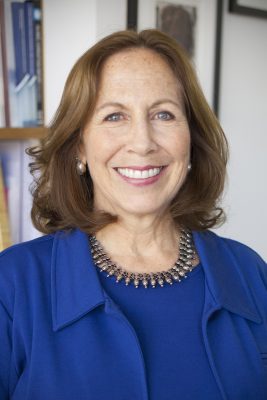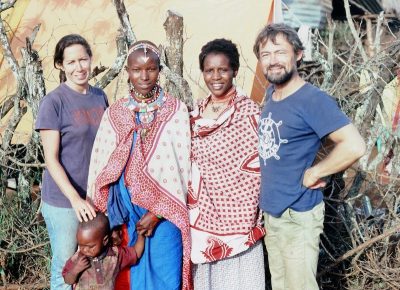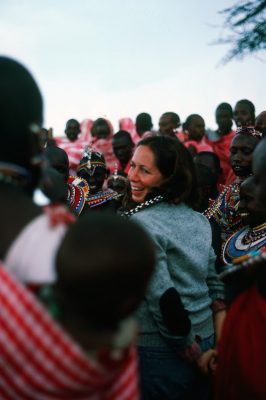Suzanne Grant Lewis ’78 stands as a remarkable example of how a School of Education degree in Selected Studies in Education can be leveraged into a globe-trotting career supporting higher education. Crafting her degree around interests in the interplay of education and development in Africa, Grant Lewis says she launched her career from the firm academic foundation she built at Syracuse University.
 Born into a family with six siblings, Grant Lewis’ parents instilled the value of education early on. Despite financial constraints, her parents were adamant that all their children would attend college. When SU proved to have the best financial package, she says her choice was made. Initially considering teaching through the Peace Corps, she soon pivoted her focus towards understanding the role of education and education policy thanks to Maxwell School of Citizenship and Public Affairs classes taught by Professor Bill Coplin.
Born into a family with six siblings, Grant Lewis’ parents instilled the value of education early on. Despite financial constraints, her parents were adamant that all their children would attend college. When SU proved to have the best financial package, she says her choice was made. Initially considering teaching through the Peace Corps, she soon pivoted her focus towards understanding the role of education and education policy thanks to Maxwell School of Citizenship and Public Affairs classes taught by Professor Bill Coplin.
Really Pivotal
Guided by her mentors and personal interest, Grant Lewis crafted her own academic path, combining courses in African Studies, Cultural Foundations of Education, and Public Policy. “I became less interested in teaching and more interested in the role that education plays in developing countries,” she says. The advice of Robert G. Gregory, a professor of East African Studies, led her to spend a semester in Kenya, where she delved into African history and gained insight into the political economy of educational development in the region.
“He told me, ‘we get people who go far into their doctoral studies and then realize they don’t like living in Africa, so early in your career, you should spend time there before you make a lifelong commitment,’” she remembers. That semester abroad was a turning point that solidified her desire to work in the field of educational development.
To graduate—and as a requirement of her enrollment in SU’s Honors Program—Grant Lewis wrote what she calls an “awful thesis” on political socialization in schools in Kenya and Tanzania. “I think students should have to be finished with their thesis before the spring of your senior year, because you’re seriously distracted by then,” she says with a laugh.
“You can’t have strong basic education without higher education—people to write the curriculum and train teachers.”
Grant Lewis is adamant that no one should ever read her thesis, but the effort to complete it exposed her to a lot of theory. She produced a comparative study, working from secondary sources, and believes the coursework and the academic background gained helped her secure a Rotary Fellowship to pursue education research in Kenya and work towards a master’s degree.
“The resources at Syracuse were really, really pivotal and guided me in my studies there and in my future work,” she says.
Clear Thread

After graduating and before starting the fellowship, Grant Lewis taught at St Lucy’s Raruowa Secondary School, an all-girls Catholic boarding school in Homa Bay, on the shores of Lake Victoria. She knew having teaching experience in Africa was pertinent in order to speak competently to the challenges teachers face there. She lived at the school, taught East and West African history and mathematics, and coached soccer.
One struggle at St. Lucy’s, she says, was the loss of students every year to pregnancy. Grant Lewis asked the headmistress if she could bring in speakers and connect the girls to resources and clinics in the area. “The leadership was actually very progressive,” she says. “So I organized sessions with the girls on birth control. I have such stories from that. … Oh, the lines the boys would give the girls. It was quite funny.”
For her fellowship she moved to Nairobi, completing research projects and master’s coursework, which eventually transferred to a year’s credit at Stanford University toward her doctorate. The experiences in Africa enriched her perspective and, she says, served as another building block to grow her career.
“There’s a clear thread from Syracuse to those early experiences after graduating,” she observes.
One of her earliest major accomplishments came during her time wrapping up at Stanford. “One of my proudest achievements is defending my dissertation while eight months pregnant,” Grant Lewis recalls with a wide smile. “In the later months of your pregnancy, you feel really strong. I was doing something my all-male dissertation committee could not do—have a baby—and that gave me confidence.”
Vantage Point

Now with a family, Grant Lewis moved back to Africa, living in Namibia and then Malawi, before joining the faculty at the Harvard Graduate School of Education, where she was charged with designing a new master’s degree program in International Education Policy. “The world came through to Harvard, so I learned a lot,” she says. “I loved teaching but did not like writing for academia, nor the limited support I received as a junior faculty member.”
Nevertheless, Grant Lewis spent eight years at Harvard before moving into philanthropy, leading coordination for a partnership across four foundations that later grew to seven—Carnegie, Ford, Hewlett, Kresge, MacArthur, Mellon, and Rockefeller—which funded efforts to support African universities. She facilitated consultations between African university leaders and the foundations, increasing initiatives in internet connectivity, e-learning, research, and sustainability for the next generation of academics.
“Conventional knowledge at that time was we just need to invest in basic education,” she says. “But this collaborative was saying, ‘No, you need to invest in the intellectual resources of a country.’ You can’t have strong basic education without higher education—people to write the curriculum and train teachers.”
This experience provided Grant Lewis with a unique vantage point, allowing her to facilitate impactful work across foundations while nurturing leadership trainings rooted in shared goals. Her “networked brain” helped in the role, she says: “I’m always seeing the connections, helping people to connect and capitalize on each other’s work.”
Building Capacity
In 2011 Grant Lewis helped launch the International Education Funders Group, a collaborative of more than 50 foundations to help private donors advance Education for All. A year later she moved to the International Institute for Educational Planning (IIEP-UNESCO) as its deputy director and was appointed the first female director two years later.
“I’m very proud of being the first female director at this institute, which was established in 1963,” she says. “It was long overdue. Also, for much of my time at UNESCO, I served as the highest-ranking US citizen.”
Grant Lewis’ leadership at UNESCO brought fresh perspectives, gender inclusivity, and innovative approaches to the organization. Under her guidance, the institute engaged in applied research, policy development, technical assistance, and capacity building across various countries, leaving a lasting imprint on education in developing countries.
“If you’re particularly interested in international work, get into the field, because it’s what you hang everything else on.”
When Grant Lewis retired from UNESCO in May 2021, the very next week she joined a nonprofit startup called education.org based in Zurich, Switzerland. She laughs at the fact that she’s its longest serving staff member, where her focus is on analyzing and writing for policy makers. She’ll stay in that position for another year, she believes.
Fulfilling Experiences
Given her impressive career, Grant Lewis has plenty of advice for those starting on their journey. When looking for a job, she advises new professionals to find a place that will motivate you and appreciate you: “If you’re in a job and you stop learning, you should move on. And, if you feel you’re not being appreciated, like for me at Harvard, move on.”
The roles she’s taken, she says, have led to fulfilling experiences.
For females, she adds: “Don’t talk yourself out of a job just because you haven’t done it before. Where females too often say, ‘Well, I haven’t done that. I don’t know if I can.’ Males might say, ‘I could do that.’” She has advised women to think of such roles as a challenge and approach them by thinking about what they can bring to the position.
Lastly, she advises all students to gain hands-on experience in what interests you early on. “If you’re particularly interested in international work, get into the field, because it’s what you hang everything else on,” she says, adding it will enrich your value in a future career or higher degree.
Plus, Grant Lewis says of taking on a field role, “Your understanding of cultural nuances, political economy, and the pace of change will be greater.” She adds, “The best graduate students I’ve worked with were the ones coming back to school for their masters having done some work in the field. They were far more engaged and had more to offer.”
By Ashley Kang ’04, G’11 (a proud alumna of the M.S. in Higher Education program)
Learn more about the School of Education’s Selected Studies in Education bachelor’s degree program or contact us at SOEadmissions@syr.edu.
